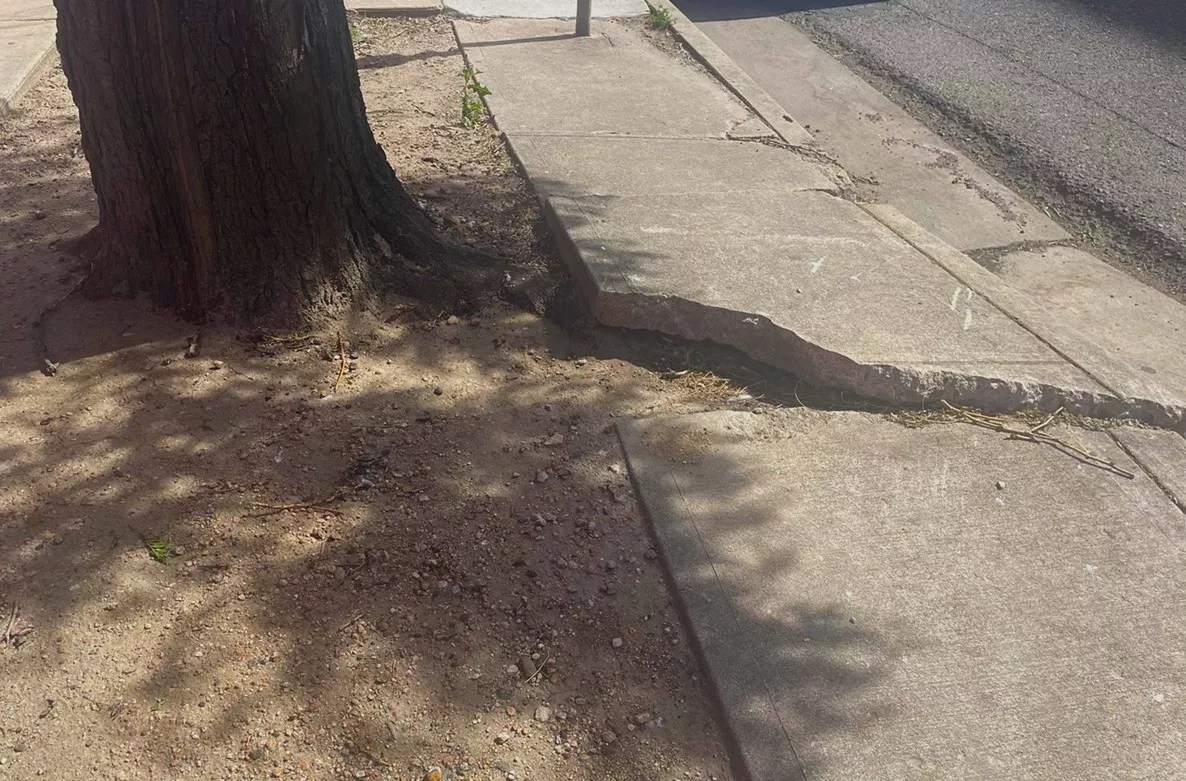
Catie Cheshire

Audio By Carbonatix
Denver residents now know what they will have to pay when the first charge for the new sidewalk construction and repair fee, approved by voters back in 2022, hits next January.
The original ordinance would have charged property owners based on their linear feet of sidewalk and the type of street the property sits on. After concerns about skyrocketing prices for property owners with corner lots or more sidewalk space, the city Department of Transportation and Infrastructure convened a stakeholder committee, which determined that a flat fee was better.
Every property owner will be charged a base rate of $150 annually – except those with over 230 linear square feet of sidewalk and a high impact on the sidewalk network. They will pay an additional impact fee of $3.50 for every foot over 230 linear feet.
The fees will be included on stormwater bills, split over two payments each year. Like the original proposal, the city expects the fees to generate around $40 million annually.
“The committee was very concerned about maintaining revenue neutrality so that the fee does actually generate enough funds to build out the network in a timely manner, and also to maintain it in a good state of repair going forward,” Jill Locantore, executive director of the Denver Streets Partnership and chair of the stakeholder committee, said in an August 20 meeting.
According to Locantore, only around 1 percent of single-family homes and about 4 percent of commercial properties will incur the impact fee. Those who are affected by the impact fee will pay the same amount or slightly less than they would have under the original proposal, according to the DOTI committee.
The only exempted account will be the airport, so even the state Department of Transportation will be charged for properties it owns in Denver.
Multi-family apartment buildings were one of the trickiest considerations for the committee, according to DOTI’s Nick Williams. In the end, buildings with over 25 percent of their units deed-restricted as affordable housing will be given a 20 percent discount on the fee.
“Yes, theoretically, some residents who in that building would not normally meet the individual need would get a little bit of a discount,” Williams said. “Since we know that fees that go to landlords – and I’ve previously been a landlord – do get passed down to the renters on their rent, this was the only way we could think of to get some sort of relief to those properties.”
The final decision on fees still needs to be approved by Denver City Council, but having numbers is a relief to many after a myriad of delays has slowed the sidewalk fee’s implementation. It’s unlikely the council will change the dollar amounts for the fee, even if it makes other minor changes.
The Denver Streets Partnership has been advocating to switch the administration of sidewalk repairs from individual property owners to the city since 2015. The nonprofit dedicated to improving safety and mobility on Denver’s streets succeeded in pushing Ordinance 307, approved by 56 percent of voters in 2022, to make that switch.
Since then, city council has delayed the implementation of the fees by six months twice as DOTI massaged the fee amount. Still, council has maintained the program’s importance for getting Denver’s sidewalks into shape.
The Denver Streets Partnership had estimated it would take the city 400 years to complete its sidewalk network, including repairing existing sidewalks in disrepair, without the ordinance. Williams said there are around 1,200 miles of sidewalks in Denver currently considered deficient and 320 miles of places without sidewalks that need them.
Although the ordinance originally declared that work would be completed within nine years, the stakeholder committee changed the language to “nine years or as soon thereafter.”
“The point of this ordinance was voters felt that the city was not building out the sidewalk network fast enough,” Williams said. “When we give ourselves the flexibility here, that doesn’t mean we just kick our feet up and say we’ll see you in 300 years. No, you guys will see updates on progress.”
Other changes include new eligibility terms for discounts. Originally, all neighborhoods identified by the city’s Neighborhood Equity & Stabilization (NEST) program would have gotten an automatic 20 percent discount, but the committee realized that wealthy people in those areas could benefit, or low-income people in others wouldn’t be paying an appropriate amount.
Instead, the stakeholders suggested an instant rebate program for property owners that aligns with Denver’s new Pay As You Throw trash fee system. Under that program, those making less than 60 percent of the area median income (AMI) get a 50 percent discount; those making less than 50 percent AMI get a 75 percent discount; and those making less than 30 percent are exempt from payment. The same application process would cover people for both discounts.
Finally, rather than calculating whether there are changes needed for inflation every five years, there will be an annual update under the final proposal. Williams said DOTI expects about 3 percent of the funds will be needed to administrate the fund, which is similar to bonds passed by voters.
The city council Land Use Transportation & Infrastructure Committee passed the suggested final fee structure on to the full council. According to DOTI, the proposal will be considered in the coming weeks.
Once passed, the city will begin constructing a sidewalk master plan, including community engagement. Williams said that DOTI has already identified places that could use spot repairs and is ready to immediately use the funds collected in January to help deliver already open sidewalk contracts with the city.